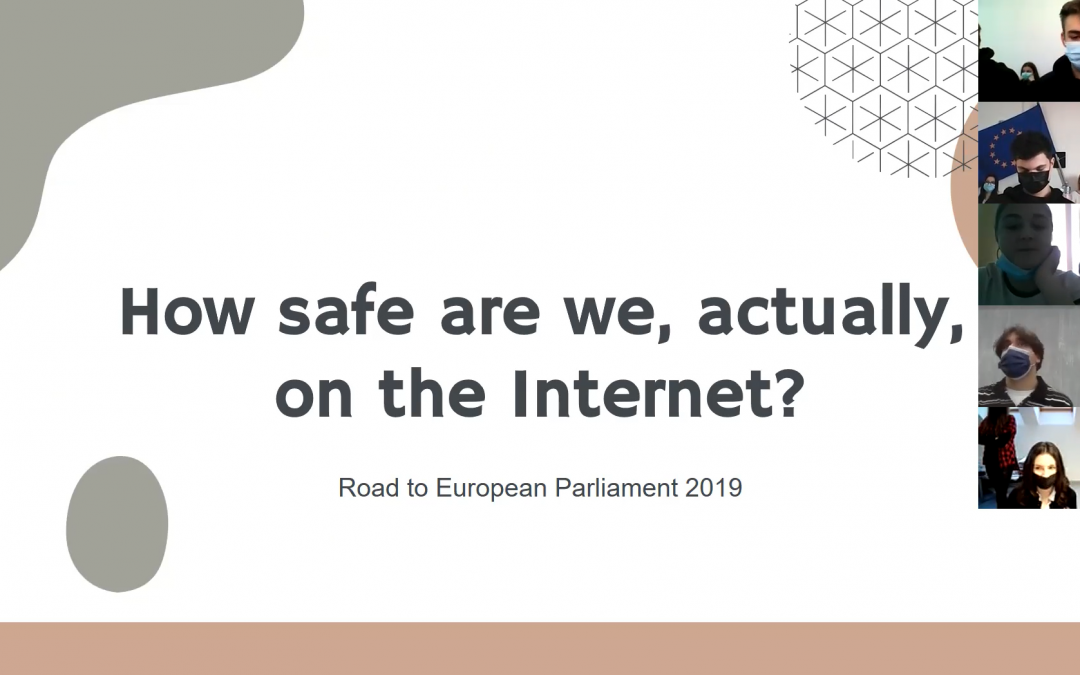The Road to the European Parliament 2019 – Empowering a New Generation of EU Citizens (REP2019)
Millions of EU citizens are using the internet everyday for many different reasons and tasks. More rigorous regulations on internet safety are needed to protect EU citizens from cyber attacks, the stealing of personal data and scams. On 15 December 2020, the European Commission submitted two legislative proposals: Digital Services Act and Digital Markets Act to the European Parliament and the European Council. The aim of these acts are to create a safer digital space where the fundamental rights of users are protected and to establish a level playing field for businesses.
On 25 November 2021, high school students from Lithuania, Spain, Italy and Romania once again took on the role of the EU institutions, and this time they decided to work on a Directive addressing safety on the internet: cybersecurity, personal data, children safety on the internet, copyright, market and online payment security. Due to the ongoing pandemic this event was done virtually and replaced the session that was scheduled to take place in Romania.
The event began with a wonderful video introduction of the host country: Romania. The aim of this simulation game was for the high school students to discuss, debate and agree on the Directive on safety on the internet proposed by the European Commission (Romania). The simulation began with a brief introduction to the topic of internet safety. Following this introduction to the topic, Romania (European Commission) presented their Directive to be discussed and debated by the European Parliament (Lithuania, Spain and Italy). The debate was separated into five breakout sessions: 1. Cybersecurity, 2. Personal data protection, 3. Children safety on the internet, 4. Copyright, and 5. Market and online payment security.
The European Parliament (Lithuania, Spain and Italy) presented their position on the different proposals to the rest of their colleagues. Some of the raised points included:
Proposal 1: Toughen standards on cybersecurity in all public spaces and platforms
- Educate EU citizens about cybersecurity
- Encourage EU citizens to higher standards of cybersecurity
Proposal 2: To ensure consistent and high level of protection all EU citizens, the level of personal data protection should be equivalent across all Member States
- Create a “white list” of apps and online sites that are legally enabled by the EU and can protect your IP and personal data
- Create a special mark for apps and online sites which indicate that the app and site are safe
Proposal 3: Create a safer online environment for children, promote self-regulatory initiatives and public awareness programs
- Create and establish universal internet safety classes for all students in all Member States from pre-K to last year of high school
Proposal 4: Tighten copyright regulations, establish the infrastructure, tools and Human Resources needed to ensure copyright protection
- Establish an oversight committee to authorize and monitor the legal use of copyrighted intellectual property
- Create an application or site to check whether intellectual property found online is copyrighted or not
Proposal 5: Tighten regulation on market and online payment security
- Strengthen apps and online sites’ security systems
- Establish oversight committee to monitor market place security
The main Directive’s aim is to establish EU regulations on internet safety to be followed by all Member States. There must be collaboration between all Member States in order to create a functional and protective Directive in regard to internet safety.
After taking into consideration the feedback by the European Parliament, the final vote was:
Proposal 1 to 5: Approved by Qualified Majority
The final voting signaled for the end of the event.
The next simulation event will take place in Lithuania (virtually) on 10 December.


Recent Comments